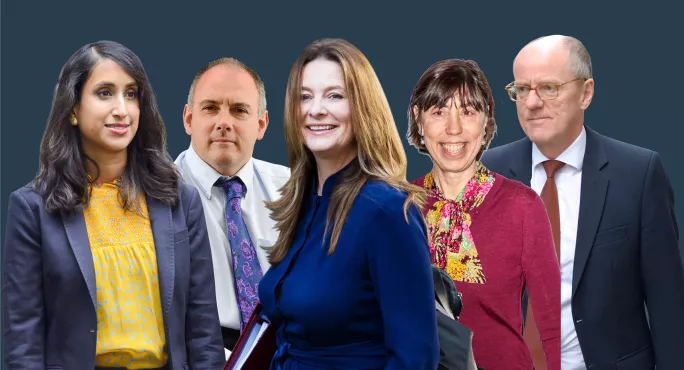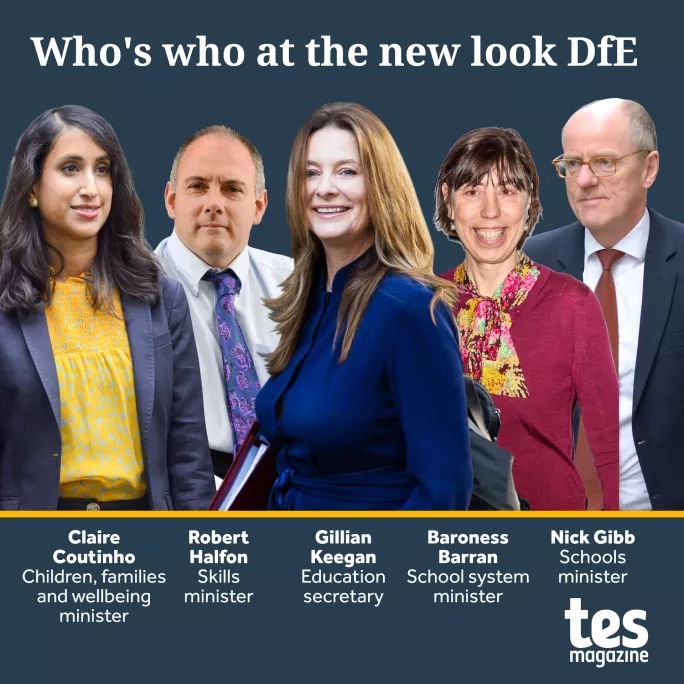DfE confirms ministerial briefs: Who is doing what?

New ministerial roles at the Department for Education suggest the government remains committed to introducing new regulations for multi-academy trusts but is not looking to expand grammar schools.
A ministerial team was appointed two weeks ago after Rishi Sunak became the latest prime minister, but their actual roles within the department have only now been confirmed.
As widely expected, Nick Gibb has returned as schools minister, a post he held for much of the past decade.
Robert Halfon has been appointed minister for skills, apprenticeships and higher education, while Claire Coutinho’s role is minister for children, families and wellbeing.
Regulating MATs: still a priority
The portfolios of the new team give an indication of the government’s political priorities on education.
Baroness Barran is the only minister to have remained at the department throughout this year’s repeated reshuffles, which has seen five different education secretaries in the space of four months - the latest being Gillian Keegan.
Baroness Barran, previously minister for the school system, has had “and student finance” added to her title.
Her updated portfolio now includes “regulatory review” and “overall approach to academisation”.
A new regulatory framework for MATs was set to be introduced by the Schools Bill this year.
However, large swathes of this legislation, which set out the scope of the regulatory powers, were withdrawn after concerns were raised in the House of Lords that it would give the government too much control over the day-to-day running of schools.
The DfE then appointed an expert panel to help it to redraft its plans for new powers and standards to regulate MATs. Baroness Barran’s portfolio suggests this area will continue to be worked on by ministers.
Grammar school focus dropped?
Another key change in ministerial responsibilities from those set out in Liz Truss’s government concerns grammar schools.
The former schools and childhood minister Kelly Tolhurst’s brief had included strategy for schools, including standards and “selection”.
At the Conservative Party Conference last month, the then school standards minister Jonathan Gullis said he hoped legislation allowing new grammar schools would be brought forward before the next election.
However, school selection is now not mentioned anywhere in the new ministerial briefs.

Freedom of speech in education
Another change in responsibilities has been revealed in the role of Claire Coutinho.
Her post as minister for children, families and wellbeing includes many of the responsibilities Ms Tolhurst held in her role encompassing special educational needs and disabilities - including high needs funding; alternative provision; children’s social care; children in care; children in need and child protection.
However, it also includes a new responsibility: freedom of speech in education.
Return of big names in Gibb and Halfon
When it was announced that Mr Gibb and Mr Halfon were returning to government, it was widely expected that they would return to their previous roles as schools and skills ministers respectively.
Mr Gibb has been a schools minister for most of the last decade, having been first appointed in 2010 when Michael Gove was education secretary for the coalition government.
He lost this role in 2012 but returned to it in 2014 and remained in post until a reshuffle in 2021, which also saw then education secretary Gavin Williamson leave his post.
He has been synonymous with much of the Conservative Party’s education policy over the last 12 years, including the reform of exams, the promotion of the English Baccalaureate and the use of phonics.
Mr Halfon has also been a significant figure in education, having served as the skills minister in Theresa May’s government and been chair of the Commons Education Select Committee since 2017.
You need a Tes subscription to read this article
Subscribe now to read this article and get other subscriber-only content:
- Unlimited access to all Tes magazine content
- Exclusive subscriber-only stories
- Award-winning email newsletters
Already a subscriber? Log in
You need a subscription to read this article
Subscribe now to read this article and get other subscriber-only content, including:
- Unlimited access to all Tes magazine content
- Exclusive subscriber-only stories
- Award-winning email newsletters
topics in this article



